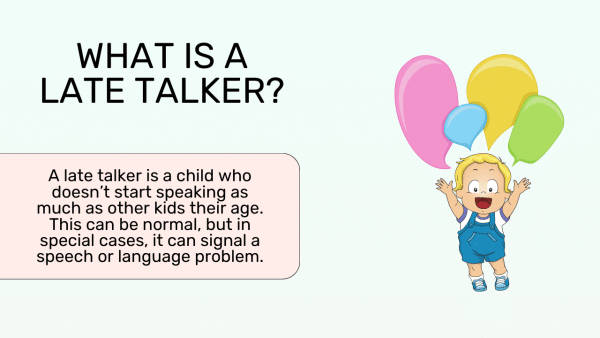A late talker is a child who doesn’t start speaking as much as other kids their age. This can be normal, but in special cases, it can signal a speech or language problem, and it’s important to talk to a doctor about it.

A late talker is a child who doesn’t start speaking as much as other kids their age. This can be normal, but in special cases, it can signal a speech or language problem, and it’s important to talk to a doctor about it.

What causes a child to be a late talker?
There can be many reasons for a child to be a late talker, including hearing loss, developmental delays, or difficulties with oral motor skills. At times, the causes may not be clear and may require further evaluation by a doctor or speech therapist.
Is a late talker a sign of a more serious problem?
Being a late talker can, in some cases, indicate a more serious problem, such as autism or a language disorder. However, in many cases, late talking is simply a developmental delay that can be overcome with the help of speech therapy.
How can I help my child if they are a late talker?
To help your child if they are a late talker, you can provide them with opportunities to practice speaking and engage in activities that promote language development. It may also be helpful to seek the advice of a doctor or speech therapist, who can offer more specific guidance and support.
A late talker is a child who doesn’t start talking or speaking as much as other kids their age. Most babies start saying simple words, like “mama” and “dada,” around one-year-old. But some children don’t start talking until they’re two years old or older. This can be normal for some kids, especially if they have other ways of communicating, like pointing or gesturing. But, in some cases, it can be a sign of a speech or language problem that needs to be addressed. Talk to your doctor immediately if you’re worried about your child’s speech development. They can help you figure out if there’s a problem and what you can do to help your child start talking more.
Late talkers may have underlying conditions affecting their speech development. Identifying these conditions helps parents seek appropriate support and interventions.
Recognizing associated conditions aids early detection and intervention for optimal speech and language development. Goally, our tablet product, helps kids with late talking by offering interactive apps for life and language skills. With digital visual schedules, AAC, gamified learning, and apps for emotional regulation, executive functioning, bedtime routines, and social skills, Goally supports comprehensive development.
This post was originally published on Feb. 13, 2023. It was updated on July 8, 2023.